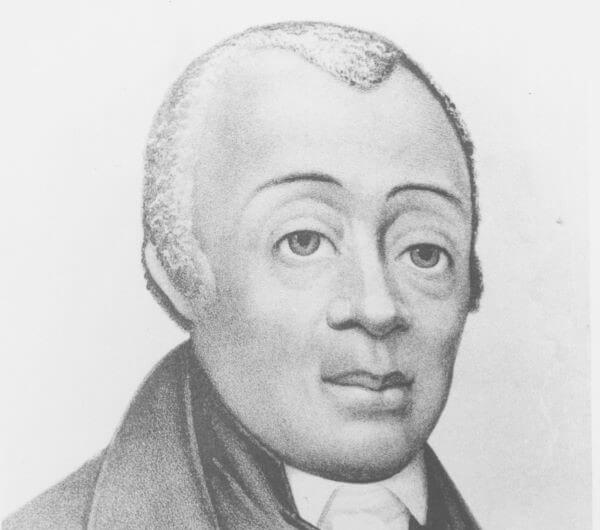We’ve all heard the names John and Charles Wesley, but there are a lot of other important names in the history of Methodism you may not know. The Unsung Heroes of Methodism series tells the stories of lesser-known figures whose lives and witness still impact The United Methodist Church today, even if their names aren’t familiar to us.
Meet more heroes
Bishop Richard Allen was a gifted preacher, fearless abolitionist, educational reformer, and founder of the African Methodist Episcopal (AME) Church, the oldest independent African American denomination in history.
Born into slavery in Delaware on February 14, 1760, Allen was originally owned by Benjamin Chew, a future Supreme Court justice. His family was later sold to a planter named Stokley Sturgis, who subsequently sold Allen’s mother and two of his siblings, permanently separating the family.[1]
As a teenager, Allen began attending a Methodist group, one of the few religious communities that welcomed both Black and white worshippers. He also taught himself to read and write. One of the leading Methodist preachers in Delaware, Freeborn Garrettson, who openly condemned slavery in his sermons, eventually persuaded Allen’s master to allow his enslaved workers to buy their freedom. In 1780, after years of extra labor, Allen obtained his freedom and adopted the surname Allen.[2]
Even before securing his freedom, Allen had become deeply involved in the Methodist movement, emerging as a leader among the local Black members. In 1784, he was one of only two African Americans, alongside Harry Hosier, to attend the Christmas Conference that established the Methodist Episcopal Church. However, neither man was allowed to vote.[3]
In 1786, Allen was assigned as a preacher to St. George’s Methodist Episcopal Church in Philadelphia, where he was joined by another Black preacher, Absalom Jones. Their sermons attracted new converts of both races. However, white church leaders began imposing racial segregation, relegating Black congregants to the balcony, far from the altar.[4]
Frustrated by these discriminatory practices, Allen and Jones led a walkout of Black congregants from St. George’s in 1787. Pooling their resources, they purchased land on Sixth Street in Philadelphia and, in 1794, established Mother Bethel, the first African American-owned church in the United States.[5]
Allen married his first wife, Flora, in 1790. Following her death in 1801, he married Sarah Bass, a former slave from Virginia, in 1802. The couple had six children, and Sarah played a crucial role in organizing the women of the church into a support group. Today, she is celebrated as a "founding mother" of the AME Church.[6]
Initially, Allen and Jones relied on traveling white Methodist pastors to administer communion until 1799 when Allen was officially ordained as an elder by Francis Asbury. Over the following years, more African American Methodist congregations opened in Philadelphia. In 1816, five of these congregations were united to form the African Methodist Episcopal Church, the first independent African American denomination in the United States. Allen was elected as its first bishop.[7]
Beyond his pastoral ministry, Allen was also an active advocate for African American rights. He and Jones petitioned Congress for the abolition of the slave trade and called for African American citizenship and equality—causes that would not be realized until the passage of the 14th Amendment over 60 years later. The Allen family also used their home as a station on the Underground Railroad, helping enslaved people escape bondage. In 1830, Mother Bethel hosted the first-ever national meeting of African American leaders, known as the Colored Convention, a precursor to later civil rights organizations such as the NAACP.[8]
Allen passed away in 1831 at the age of 71 and was buried at Mother Bethel AME.[9] His legacy endures through the many schools, streets, and institutions named in his honor, including Allen University in Columbia, South Carolina. In 2016, the United States Postal Service issued a commemorative stamp in his honor. The congregation he and Jones founded in Philadelphia continues to worship to this day.
Born a slave and dying a bishop, Richard Allen was a pioneer in both Methodism and American history who founded the first African American-led Christian denomination and fought tirelessly in pursuit of just causes well ahead of his time.
[1] George, Carol V.R. Segregated Sabbaths; Richard Allen and the Emergence of Independent Black Churches 1760–1840. New York: Oxford University Press., 1973.
[2] Idem
[3] Idem
[4] "The African Methodist Episcopalians." Religious Movements. University of Virginia, 2006.
[5] Idem.
[6] Nancy I. Sanders. America's Black Founders: Revolutionary Heroes and Early Leaders with 21 Activities. Chicago Review Press, 2010.
[7] George, Carol V.R. Segregated Sabbaths; Richard Allen and the Emergence of Independent Black Churches 1760–1840. New York: Oxford University Press., 1973.
[8] Henretta, Jones. "Richard Allen & African-American Identity." Early America Review, Spring 1997.
[9] George, Carol V.R. Segregated Sabbaths; Richard Allen and the Emergence of Independent Black Churches 1760–1840. New York: Oxford University Press., 1973.





